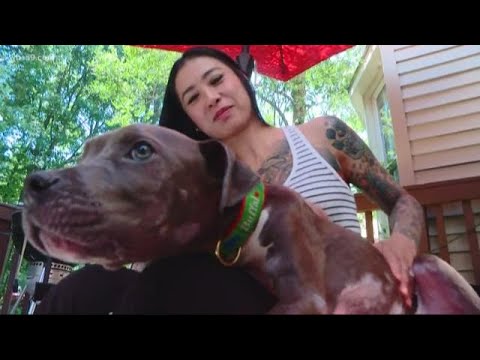Does your fur-baby suffer from itching, odor, skin irritations, ear infections, red eyes, bumps, hives, paw licking and hot spots? These symptoms can be signs that your sweet little fur-baby is experiencing allergies, also known as Atopic Dermatitis. Bullies often suffer from bacterial, contact, inhalant and food allergies.
Food Allergies
Bullies can develop food allergies anytime during their lifetime. Often times they can become allergic to food they have eaten for most of their life. This will usually occur when the brand of food adds or changes their ingredients. Common ingredients that Bullies are sensitive to are artificial sugars, chemical preservatives, fish, eggs, whey, chicken, milk, pork, beef, wheat, corn and soy products. Fur-moms and dads may notice symptoms develop in their fur-baby such as vomiting, gagging, sneezing, seizures, asthma, behavioral changes, itchy skin, shaking head, rubbing their face on carpet, licking and biting their feet, flatulence, diarrhea, coughing and ear infections and inflammation. You can help your fur-baby find relief by providing a high quality, immune boosting diet. You may have to provide a home cooked diet, raw diet or a limited ingredient diet for your adorable fur-baby.
Contact and Environmental Allergies
Although these allergies are the least common, they can be the source of your fur-kid experiencing allergies. Environmental allergies such as freshly cut grass, blooming flowers and dust mites are inhaled from the air and can cause irritation. Contact allergens include sensitivity to shampoo, cleaning products used in the home and on bedding, flea collars, grass and plants. You can help lessen your fur-baby’s reaction to allergens by vacuuming frequently, using organic natural cleaning products and laundry detergent, changing air conditioning filters frequently and lessening exposure to outdoor elements.
Flea Allergies
An allergic reaction to a flea bite is what causes severe itching in bullies. It’s the skins reaction to the exposure of protein that is found in flea saliva. Bullies that are exposed to fleas occasionally are susceptible to experiencing severe itching at the site of the flea bite. One flea bite can cause a reaction that lasts up to five to seven days.
Bacterial Allergies
Staphylococcus hypersensitivity causes microscopic changes in blood vessels of the skin. This condition usually develops when inhalant allergy, flea allergy or hypothyroidism is present. Staphylococcus hypersensitivity, also known as bacterial allergies of the skin, is a dog’s immune system overreacting to the normal existence of Staph bacteria on the skin. Diagnosis is based on the results of a bacterial culture and examination by a licensed veterinarian.
Bullies can experience allergies that have a wide range of symptoms. At the first sign of unusual behavior, itchiness or illness, seek the advice of a licensed veterinarian. Allergies can be prevented and maintained with proper care. At times, symptoms of allergies can lead to more serious ailments such as infection. Consistent scratching to one area repeatedly can cause the skin to become more irritated and will begin to bleed. Always seek the attention of a veterinarian to help pinpoint the cause of the allergy and to provide the best care possible for you sweet little fur-baby.






